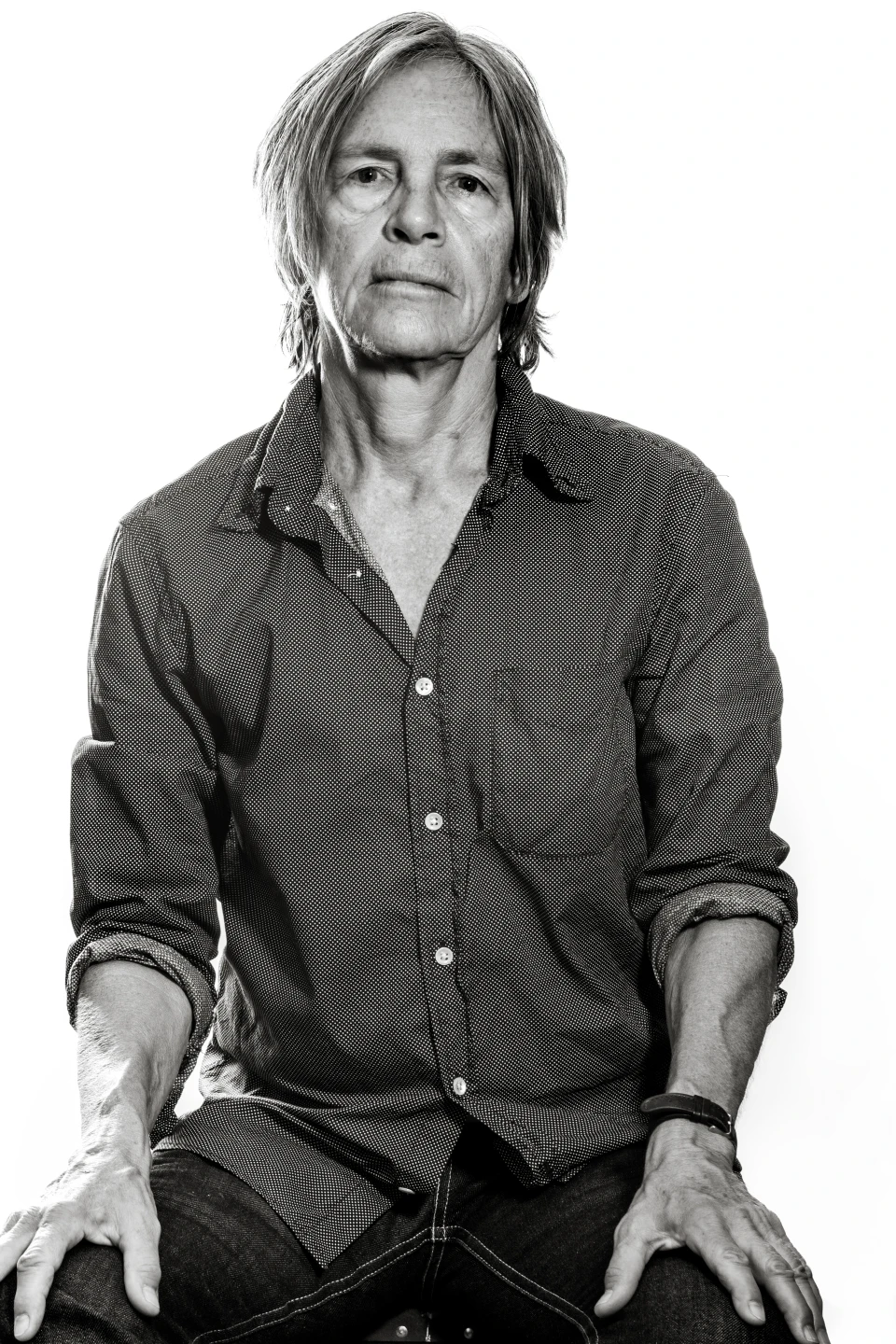
Eileen Myles. Photograph: Shae Detar
This activity is centred on Eileen Myles, one of the most unique voices in poetry and an international figure of LGBTQI+ literature, in an encounter which takes the form of a lecture and recital and also features the participation of journalist Nerea Pérez de las Heras and her reading of the manifesto I Want a President (1992), by artist Zoe Leonard and the poet Flor Braier in moderating the conversation.
In their direct and confessional writing, Myles explores themes of gender, sexuality and body, their style characterised by first-person prose replete with humour and social critique, where personal life and political activism intertwine to form a key voice in the visibility of LGTBQI+ rights. Their best-known works most notably include Chelsea Girls (1994, translated into Spanish by Las Afueras, 2024), an autobiographical novel which narrates Myles’s youth in New York’s underground scene and sketches the construction of a personality that refuses to be typecast or yield to any conventions; I Must Be Living Twice: New and Selected Poems 1975-2014 (2016), a compilation of forty years of confessional poetry, and Pathetic Literature (2022), an anthology published by Myles which brings together work by different writers around the idea of the pathetic.
During the 1970s and 1980s, Myles was an active participant in New York’s culture scene — along with such icons as Patti Smith, David Wojnarowicz, Kathy Acker and Robert Mapplethorpe — and in 1992 they ran for president of the United States as part of a satirical campaign denouncing the exclusion in the electoral system of those who did not respond to the male pattern of power. This stance, straddling performance and institutional critique, bolstered their status as a counterculture figure and prompted the artist Zoe Leonard to write I Want a President, a poem which has become a manifesto on difference.
Acknowledgements
Organised by
Museo Reina Sofía
Participants
Flor Braier (Buenos Aires, 1979) is a literary translator, poet and composer. She has published the books Bambalinas (Editorial Vinciguerra, 2008) and Los nombres propios (Editorial Caleta Olivia, 2018), and, as a soloist, has released Pony Feelings, Río, Nit and Duermen los animales, as well as translating work by Diane di Prima, Chris Kraus and Eileen Myles, among other authors.
Eileen Myles (Cambridge, 1949) is a poet and novelist. They have published almost twenty volumes of poetry and prose, most notably Not Me (Semiotext(e), 1991); Chelsea Girls (Black Sparrow Press, 1994); Cool for You (Soft Skull, 2000); Skies (Black Sparrow Press, 2001); Sorry, Tree (Wave Books, 2007); The Importance of Being Iceland: Travel Essays in Art (Semiotext(e), 2009); Inferno: A Poet's Novel (OR Books, 2010); I Must Be Living Twice: New and Selected Poems 1975-2014 (HarperCollins, 2016); Afterglow: A Dog Memoir (Grove Press, 2017); and Evolution (Grove Press, 2018). They have also directed The Poetry Project, a key centre of experimental poetry in New York, and have been honoured with a Guggenheim fellowship, a Creative Capital Arts Writers Grant from the Andy Warhol Foundation, four Lambda Literary Awards and the Shelley Award from the Poetry Society of America, among others.
Nerea Pérez de las Heras (Madrid, 1982) is a journalist and communicator. She is behind the project Feminismo para torpes (2016–2019), which takes the form of a book, a theatre monologue and a series of videos. She also directs and presents the podcasts Saldremos mejores (Podium Podcast), with Inés Hernand, and Lo normal (Cadena Ser), with Antonio Nuño, and has been honoured with the Reconocimiento Arcoíris, awarded by Spain’s Ministry of Equality, for her activism in enhancing the visibility of lesbian and trans-inclusive feminism.
Más actividades
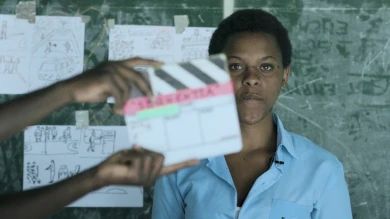
Christian Nyampeta and the École du soir
13, 14, 15 NOV, 11, 12, 13 DIC 2025
Christian Nyampeta is a Rwandan artist, musician and film-maker whose work encompasses pedagogies and community forms of knowledge production and transmission. His Ècole du soir (Evening School) is an art project conceived as a mobile space of collective learning and is named in homage to Ousmane Sembène (1923–2007), a pioneer of African cinema who defined his films as “evening classes” for the people, a medium of education and emancipation through culture.
This block is made up of three double sessions: the video work of Christian Nyampeta, the films of École du soir and one of Ousmane Sèmbene’s feature-length films. Nyampeta will introduce all three first sessions.
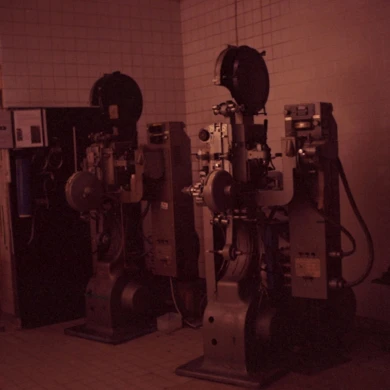
Long Live L’Abo! Celluloid and Activism
4, 5, 6 DIC 2025
L’Abominable is a collective film laboratory founded in La Courneuve (Paris, France) in 1996. It came into being in response to the disappearing infrastructures in artisan film-making and to provide artists and film-makers with a self-managed space from which to produce, develop and screen films in analogue formats such as Super 8, 16mm and 35mm. Anchored in this premise, the community promotes aesthetic and political experimentation in analogue film opposite digital hegemony. Over the years, L’Abominable, better known as L’Abo, has accompanied different generations of film-makers, upholding an international movement of independent film practices.
This third segment is structured in three sessions: a lecture on L’Abo given by Pilar Monsell and Camilo Restrepo; a session of short films in 16mm produced in L’Abo; and the feature-length film Une isle, une nuit, made by the Les Pirates des Lentillères collective.
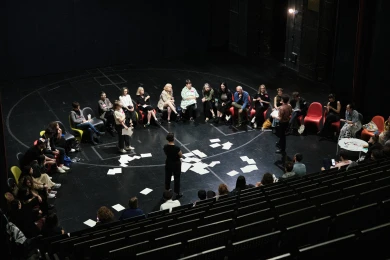
UP/ROOTING
11, 12, 13, 14, 15, 16 NOV 2025
Museo Reina Sofía and MACBA Museu d'Art Contemporani de Barcelona (MACBA) invite applications for the 2025 iteration of the School of Common Knowledge, which will take place from November 11th to 16th in Madrid and Barcelona.
The School of Common Knowledge (SCK) draws on the network, knowledge and experience of L’Internationale, a confederation of museums, art organizations and universities that strives to reimagine and practice internationalism, solidarity and communality within the cultural field. This year, the SCK program focuses on the contested and dynamic notions of rooting and uprooting in the framework of present —colonial, migrant, situated, and ecological— complexities.
Building on the legacy of the Glossary of Common Knowledge and the current European program Museum of the Commons, the SCK invites participants to reflect on the power of language to shape our understanding of art and society through a co-learning methodology. Its ambition is to be both nomadic and situated, looking at specific cultural and geopolitical situations while exploring their relations and interdependencies with the rest of the world.
In the current context fraught with war and genocide, the criminalization of migration and hyper-identitarianism, concepts such as un/belonging become unstable and in need of collective rethinking:
How can we reframe the sense and practice of belonging away from reductive nationalist paradigms or the violence of displacement? How to critically hold the entanglement of the colonial routes and the cultural roots we are part of? What do we do with the toxic legacies we inherit? And with the emancipatory genealogies and practices that we choose to align with? Can a renewed practice of belonging and coalition-making through affinity be part of a process of dis/identification? What geographies —cultural, artistic, political— do these practices of de/centering, up/rooting, un/belonging and dis/alignment designate?
Departing from these questions, the program consists of a series of visits to situated initiatives (including Museo Situado, Paisanaje and MACBA's Kitchen, to name a few), engagements with the exhibitions and projects on view (Project a Black Planet: The Art and Culture from Panafrica), a keynote lecture by Stefano Harney and Fred Moten, as well as daily reading and discussion gatherings, editorial harvest sessions, and conviviality moments.
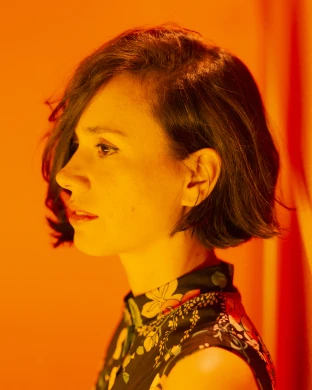
Ylia and Marta Pang
Thursday, 6 November - 8pm
The encounter between Spanish DJ and producer Ylia and visual artist Marta Pang is presented in the form of a premiere in the Museo Reina Sofía. Both artists converge from divergent trajectories to give form to a new project conceived specifically for this series, which aims to create new stage projects by setting out from the friction between artists and dialogue between disciplines.
![Carol Mansour y Muna Khalidi, A State of Passion [Estado de pasión], 2024, película](https://recursos.museoreinasofia.es/styles/small_landscape/public/Actividades/palestine%20cinema%20day%202.jpg.webp)
Palestine Cinema Days
Sábado 1 de noviembre, 2025 – 19:00 h
The Museo Reina Sofia joins the global action in support of Palestine with the screening of A State of Passion (2024), a documentary by Carol Mansour and Muna Khalidi. The film features in Palestine Cinema Days Around the World, an annual festival, held globally every November, which aims to show films made in Palestine to an international audience. The initiative was conceived as a form of cultural resistance which seeks to give a voice to artists from Palestine, question dominant narratives and create networks of solidarity with the Palestinian people.
Palestine Cinema Days Around the World originates from Palestine Cinema Days, a festival organised in Palestine since 2014 with the aim of granting visibility to Palestinian cinema and to support the local film community. In 2023 the festival was postponed because of the war in Gaza, and has since become borderless in scope, holding close to 400 international screenings in almost sixty countries in 2024. This global effort is a show of solidarity with Palestine and broadens the voices and support networks of the Palestinian people around the world.
A State of Passion exposes the atrocities committed against the Gaza population via the testimony of Dr Ghassan Abu Sittah, a Palestinian-British plastic surgeon living in London who decides to return to Gaza and save lives in the city’s hospitals amid the Israeli army’s indiscriminate bombing of the population. A necessary film exposé of the experience of unrelentingly working twenty-four hours a day for forty-three days in the Al Shifa and Al Ahli Hospitals in the city of Gaza.
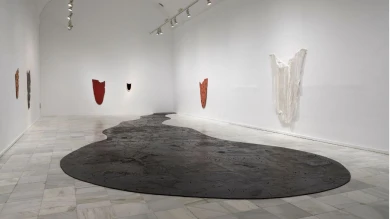
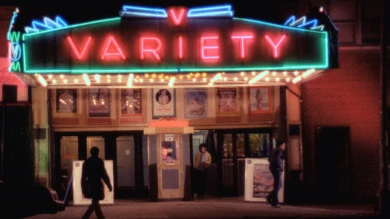
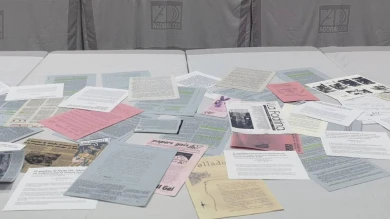
![Miguel Brieva, ilustración de la novela infantil Manuela y los Cakirukos (Reservoir Books, 2022) [izquierda] y Cibeles no conduzcas, 2023 [derecha]. Cortesía del artista](https://recursos.museoreinasofia.es/styles/small_landscape/public/Actividades/ecologias_del_deseo_utopico.jpg.webp)
![Ángel Alonso, Charbon [Carbón], 1964. Museo Reina Sofía](https://recursos.museoreinasofia.es/styles/small_landscape/public/Actividades/perspectivas_ecoambientales.jpg.webp)